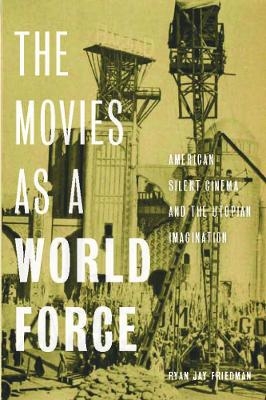
The Movies as a World Force
Rutgers University Press (Verlag)
978-0-8135-9360-9 (ISBN)
Throughout the silent-feature era, American artists and intellectuals routinely described cinema as a force of global communion, a universal language promoting mutual understanding and harmonious coexistence amongst disparate groups of people. In the early 1920s, film-industry leaders began to espouse this utopian view, in order to claim for motion pictures an essentially uplifting social function. The Movies as a World Force examines the body of writing in which this understanding of cinema emerged and explores how it shaped particular silent films and their marketing campaigns. The utopian and universalist view of cinema, the book shows, represents a synthesis of New Age spirituality and the new liberalism. It provided a framework for the first official, written histories of American cinema and persisted as an advertising trope, even after the transition to sound made movies reliant on specific national languages.
RYAN J. FRIEDMAN is an associate professor of English and the director of film studies at Ohio State University in Columbus. He is the author of Hollywood’s African American Films: The Transition to Sound (Rutgers University Press).
Acknowledgments
Introduction: Motion Pictures and Modern Communion
1 Enlightened Public Opinion: Post-Reform Progressivism, Mental Science, and Gerald Stanley Lee’s “Moving-Pictures”
2 “The Occult Elements of Motion and Light”: Vachel Lindsay’s Utopia of the Mirror Screen
3 “The Motion Picture Is War’s Greatest Antidote”: Rescue as Release of Force in D. W. Griffith’s Intolerance
4 “Everything Wooed Everything”: The Triumph of Morale Over Moralism in Rupert Hughes’s Souls for Sale
5 “Little Grains of Sand”: Positive Thinking and Corporate Form in Douglas Fairbanks’s The Thief of Bagdad
Conclusion: Universal History and the Historicity of Film Entertainment
Notes
Index
| Erscheinungsdatum | 05.02.2019 |
|---|---|
| Zusatzinfo | 20 B&W |
| Verlagsort | New Brunswick NJ |
| Sprache | englisch |
| Maße | 152 x 229 mm |
| Themenwelt | Kunst / Musik / Theater ► Film / TV |
| Geschichte ► Allgemeine Geschichte ► Neuzeit (bis 1918) | |
| Sozialwissenschaften ► Kommunikation / Medien ► Medienwissenschaft | |
| ISBN-10 | 0-8135-9360-3 / 0813593603 |
| ISBN-13 | 978-0-8135-9360-9 / 9780813593609 |
| Zustand | Neuware |
| Informationen gemäß Produktsicherheitsverordnung (GPSR) | |
| Haben Sie eine Frage zum Produkt? |
aus dem Bereich


